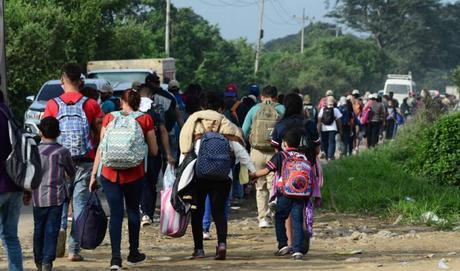Repression and criminalization of the Honduran migrant caravan
The way in which the governments of Honduras and Guatemala have approached the migration issue is not only biased and discriminatory, but also openly unfair and against human rights.
- Opinión

In the first days of the year, another migrant caravan was summoned through social networks in San Pedro Sula, Honduras. Shortly after, and in a very adverse context (due to the Covid 19 pandemic, economic precariousness and a climate of open insecurity), hundreds of Hondurans left that city in search of better socio-material conditions of existence, a life without risks and the possibility of a livable future. As documented by Radio Progreso de Honduras, it did not take long for the migrant contingent to grow, and it soon took on a dimension of thousands (it was estimated at around 9 thousand people). Among the migrants there were different groups (young people, men, families with children, adolescents, women), and they left their country with the (main) direction to the United States. Similar to the 2019 and 2020 caravans, this was framed in the context of the historical Central American migration, characterized by its massiveness (CONAPO, 2019 and 2018), by the structural origin of its causes of expulsion (poverty, low wages, insecurity and violence by crime and gangs, impacts of environmental phenomena) (REDODEM, 2019, 2018 and 2017), as well as being related to various processes of human rights transgression and violence in the countries of origin, transit and destination (Castillo Ramírez, 2020).
In a line of action similar to what happened with the October 2020 caravan, the governments of Honduras and Guatemala implemented various measures to contain and dismantle the Honduran contingent, particularly by sending security forces to different places to prevent the passage of migrants. The caravan raffled different actions to retain it as it passed through Honduras. But once it had entered Guatemalan territory, the caravan was stopped by security forces in Valle Hondo in mid-January; and many of the migrants were forced to return to Honduras. The operations through which they obstructed and detained the caravan were not only an isolated local and national strategy (in Honduras and Guatemala), but a regional policy of closing / militarizing borders and criminalizing migrants, designed and imposed from the (recently completed) Trump's anti-immigrant US government.
The way in which the governments of Honduras and Guatemala (and other countries in the region) have approached the migration issue (as a matter of "security" and as if it were criminal in nature), is not only biased and discriminatory, but also openly unfair and against human rights. Migrants not only did not commit any crime, but they are also people who had to leave their places of origin for causes beyond their control and will, and because they lived in contexts in which the minimum conditions essential to survive were not guaranteed.
Honduras is not only a country with acute poverty and disproportionate socioeconomic inequality, but also with strong contexts of corruption and violence (by crime and gangs), and with some of the highest crime and homicide rates in America and the world (Castillo Ramírez, 2018). In addition to this, it was recently severely affected by the Covid 19 pandemic and by weather events such as Hurricane Eta. In this framework, and from these policies that "criminalize" and "irregularize" Hondurans, migrants are not recognized as social subjects (characterized by various initiatives, strategies and actions) (De Genova, Picozza and Castillo, 2020), and with legitimate and unquestionable motivations to leave their country to have access to a dignified, safe and non-violent existence. It is urgent that migration ceases to be seen from an exclusive legal perspective that "criminalizes" migrants, and it must be addressed from a human dignity and rights approach.
Notes
º Castillo Ramírez, G., (2020), “Forced migration and violence process: Centroamerican migrants in their way through México”, Revista Española de Educación Comparada, número 35, Madrid: UNED, pp. 14-33.
º Castillo Ramírez, G., (2018), “Centroamericanos en tránsito por México. Migración forzada, crisis humanitaria y violencia”, Revista Vínculos Sociología, análisis y opinión, número 12, Guadalajara: U de G, pp. 39-60.
º CONAPO (2018), Anuario de migración y remesas México 2017. México: Consejo Nacional de Población, SEGOB, Fundación BBVA.
º CONAPO (2019), Anuario de migración y remesas México 2018. México: Consejo Nacional de Población, SEGOB, Fundación BBVA.
º De Genova, Nicolas; Picozza, Fiorenza; Castillo Ramírez, Guillermo. (2020). Producción de fronteras poscoloniales, ilegalidad migrante y la política de la incorregibilidad. Entrevista con Nicholas De Genova. América Latina en Movimiento, 23 de diciembre de 2020.
º REDODEM (2017). Migrantes en México: recorriendo un camino de violencia, Ciudad de México: Red de Documentación de las Organizaciones Defensoras de Migrantes.
º REDODEM (2018). El estado Indolente: Recuento de la violencia en las rutas migratorias y perfiles de movilidad en México, Ciudad de México: Red de Documentación de las Organizaciones Defensoras de Migrantes.
º REDODEM (2019). Procesos migratorios en México. Nuevos rostros mismas dinámicas, Ciudad de México: Red de Documentación de las Organizaciones Defensoras de Migrantes.
Del mismo autor
- Forced internal displacement in Mexico and processes of violence 13/03/2022
- Labor struggles against precarious work and agribusiness exploitation 09/01/2022
- Detentions, deportations, and criminalization of migrants 29/11/2021
- México: detenciones, deportaciones y criminalización de los migrantes 15/11/2021
- Visibility of migrant voices and subjects 18/10/2021
- La decolonialidad y el abordaje de las movilidades humanas transfronterizas 01/10/2021
- Migrants, social organizations, and policies to control cross-border mobility 20/09/2021
- Decoloniality and sense of the production of social knowledge 06/09/2021
- Decolonialidad y sentido de la producción de conocimiento social 26/08/2021
- México: migrantes, organizaciones sociales y políticas del control de las movilidades transfronterizas 09/08/2021
